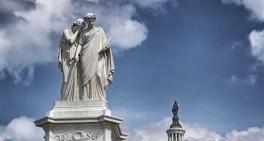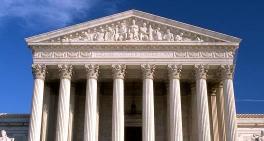Retailers hope for certainty as Supreme Court hears tax case
Notable Attorneys
Retailers are hoping for a resolution this year from the Supreme Court, which hears arguments Tuesday in a decades-old dispute: Whether companies must collect sales tax on items sold in a state where they don't have a store or other building.
If the court backs government officials who say they're losing billions of dollars in uncollected taxes, thousands of small companies could be forced to start charging their out-of-state customers for them. Some businesses fear that could alienate customers used to tax-free shopping. On the other side: Retailers who do collect sales tax and believe those who don't have an unfair advantage.
The justices will hear online retailers Wayfair, Overstock.com and Newegg challenging a South Dakota law enacted last May requiring out-of-state retailers that have sales of more than $100,000 or over 200 transactions a year in the state to collect sales tax. Their decision could have national implications on e-commerce, although Congress can pass legislation afterward that broadens or narrows the law.
It's not only about the money, says Stephanie Harvey, owner of exit343design in Conshohocken, Pennsylvania. There are more than 10,000 sales tax jurisdictions in the United States: 35 states, the District of Columbia, counties and municipalities.
"Adding this sales tax isn't just about the tax itself — it's about the cost of time to navigate and file (taxes) or the additional expense of hiring someone to do so on behalf of the business," says Harvey, whose design and printing company has an online store and sells merchandise to other retailers.
The justices are likely to rule by June on whether to overturn a 1992 decision, Quill v. North Dakota, that said companies cannot be forced to collect sales tax from customers in a state where they don't have a physical presence like a store or distribution center. Collecting tax from online sales hasn't been a question for big online retailers like Walmart or Macy's since they have physical stores in most or all states. They also have accounting systems and financial staffs to handle the work.
Small retailers have software options to help collect taxes and do the administrative work, but it's an added cost. Whether it's worth it may depend on how much revenue a seller gets from other states. The most comprehensive software can work with the programs retailers use to process sales transactions. The software sellers determine the correct sales tax rate and submit payments and reports to tax authorities.
Related listings
-
Congressional Dems take Trump to court over foreign favors
Notable Attorneys 06/05/2018Lawyers representing nearly 200 Democrats in Congress plan to argue in federal court Thursday that President Donald Trump is violating the Constitution by accepting foreign state favors without first seeking congressional approval.The case argues tha...
-
Justices allow Arkansas to enforce abortion restrictions
Notable Attorneys 05/26/2018The Supreme Court is allowing Arkansas to put in effect restrictions on how abortion pills are administered. Critics of a challenged state law say it could effectively end medication abortions in the state.The justices did not comment Tuesday in reje...
-
Court allows Pennsylvania to redraw GOP-favored district map
Notable Attorneys 02/05/2018Justice Samuel Alito, who handles emergency appeals from Pennsylvania, rejected the request from GOP legislative leaders and voters to put on hold an order from the state Supreme Court intended to produce new congressional districts in the coming two...

Car Accident Lawyers in New Rochelle, New York
If you have gotten in a car accident, it could seriously change your life. Whether the accident was caused by the other party’s fault or a fault of your own, you’ll want to to make sure that you are ready to prepare yourself for any cases that might follow.
Immediately following any type of car accident, it is important to take certain steps to ensure that the courts will treat you with respect and fairly. First, assess your mental and physical condition. Make sure right after the accident, you document any information regarding the accident and situation, it can be of great help later on.
You’ll want to make sure that you seek professional help for any medical conditions you may be experiencing. Do not wait to seek medical attention, you’ll want to make sure that you have documented evidence of the injury that was caused by the accident. The amount of treatment is also taken into consideration in every case.




